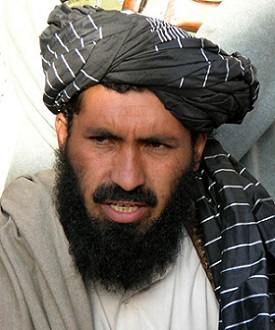
The Inter-Services Intelligence is the largest and best-known component of the Pakistani intelligence community. It is responsible for gathering, processing, and analyzing any information from around the world that is deemed relevant to Pakistan's national security. The ISI reports to its director-general and is primarily focused on providing intelligence to the Pakistani government.
Squadron Leader Khalid Khawaja was an officer of the Pakistan Air Force, and the Air Force's intelligence officer of the Pakistan's Inter Services Intelligence agency. A former member of Special Service Wing (SSW) and a veteran of Soviet–Afghan War, Khawaja described himself as a close associate of Osama bin Laden in the early days of the Afghan resistance against the Soviet Union. He was once suspected of being involved in the murder of American reporter Daniel Pearl. This was later proved to be false, but he did connect Pearl with men who would eventually kill him.

The military history of Pakistan encompasses an immense panorama of conflicts and struggles extending for more than 2,000 years across areas constituting modern Pakistan and greater South Asia. The history of the modern-day military of Pakistan began in 1947, when Pakistan achieved its independence as a modern nation.
Shaukat Sultan Khan, HI(M), afwc, psc, is a former Director General of the ISPR, the PR wing of the Pakistani Armed Forces. He served from 2003 to 2007.

Jalaluddin Haqqani was an Afghan insurgent commander who founded the Haqqani network, an insurgent group who fought in guerilla warfare against US-led NATO forces and the former Islamic Republic of Afghanistan government that they supported.
Tarar is a Jat clan of Punjabis found among Muslims in Pakistan, mainly in the Punjab region.

The 1996–2001 Afghan Civil War, also known as the Third Afghan Civil War, took place between the Taliban's conquest of Kabul and their establishing of the Islamic Emirate of Afghanistan on 27 September 1996, and the US and UK invasion of Afghanistan on 7 October 2001: a period that was part of the Afghan Civil War that had started in 1989, and also part of the war in Afghanistan that had started in 1978.

The insurgency in Khyber Pakhtunkhwa, also known as the War in North-West Pakistan or Khyber Pakhtunkhwa War, is an ongoing armed conflict involving Pakistan and Islamist militant groups such as the Tehrik-i-Taliban Pakistan (TTP), Jundallah, Lashkar-e-Islam (LeI), TNSM, al-Qaeda, and their Central Asian allies such as the ISIL–Khorasan (ISIL), Islamic Movement of Uzbekistan, East Turkistan Movement, Emirate of Caucasus, and elements of organized crime. Formerly a war, it is now a low-level insurgency as of 2017.

The Pakistani Taliban, formally called the Tehreek-e-Taliban-e-Pakistan, is an umbrella organization of various Islamist armed militant groups operating along the Afghan–Pakistani border. Formed in 2007 by Baitullah Mehsud, its current leader is Noor Wali Mehsud, who has publicly pledged allegiance to the Afghan Taliban. The Pakistani Taliban share a common ideology with the Afghan Taliban and have assisted them in the 2001–2021 war, but the two groups have separate operation and command structures.

The Haqqani network is an Afghan Islamist group, built around the family of the same name, that has used asymmetric warfare in Afghanistan to fight against Soviet forces in the 1980s, and US-led NATO forces and the Islamic Republic of Afghanistan government in the 21st century. It is recognized as a terrorist organization by the United Nations. It is considered to be a "semi-autonomous" offshoot of the Taliban. It has been most active in eastern Afghanistan and across the border in north-west Pakistan.

Maulvi Nazir was a leading militant of the Pakistani Taliban in South Waziristan. Nazir's operations were based in Wana.

Pakistanis in Afghanistan are mostly refugees, but also include laborers, traders, businesspersons, and small number of diplomats. Those working in white-collar professions include doctors, engineers, teachers and journalists. Because Pakistan and Afghanistan are neighbouring states with a loosely controlled border, and a distributed population of ethnic Pashtuns and Baloch people, there is constant flow of population between the two countries.

Hakimullah Mehsud, born Jamshed Mehsud and also known as Zulfiqar Mehsud, was a Pakistani militant who was the second emir of Tehrik-i-Taliban Pakistan, elected to the post on 22 August 2009. It was confirmed by TTP that he was killed in a U.S. drone strike in Pakistan on 1 November 2013.

The Operation Rah-e-Nijat was a strategic offensive military operation by the unified command of Pakistan Armed Forces against the Tehrik-i-Taliban Pakistan (TTP) and their extremist allies in the South Waziristan area of the Federally Administered Tribal Areas that began on June 19, 2009; a major ground-air offensive was subsequently launched on October 17. It became the integral part of the war in Western fronts which led to the encirclement and destruction of Taliban forces in the region, although the Taliban leadership escaped to lawless areas of neighboring Afghanistan.
The Pakistan Army General Headquarters attack, was a hostage-rescue mission carried by SSG Division on 10 October 2009, when 10 gunmen in military uniform opened fire on the General Headquarters in Rawalpindi, Punjab, Pakistan. The attack killed nine soldiers, nine militants and two civilians and was a major escalation in Pakistan's domestic insurgency. One militant was wounded and captured by security forces. Soon after the attack, the militants infiltrated the security buildings where 22 civilian and military officials were held hostage by the militants. The Pakistan Army immediately launched a hostage rescue operation led by the SSG Division, Army Special Forces and the 13th Regular Regiment.

Asad Qureshi is a British filmmaker who was kidnapped on 26 March 2010 by a militant group called the "Asian Tigers" in Pakistan's Federally Administered Tribal Areas along the Afghanistan border, where he was making a film in North Waziristan and interviewing Taliban leaders. Qureshi was accompanied by his driver, Rustam Khan, and two senior members of the Inter-Services Intelligence, Khalid Khawaja and Colonel Imam during his trip. All four were abducted; Khawaja was killed and his body was found a month later in Mir Ali with an attached note accusing him of spying for the United States and being responsible for killing people during the Siege of Lal Masjid. Qureshi and his driver were released in September 2010 through family negotiations after 165 days of captivity. Colonel Imam was executed in January 2011. Qureshi's release was a rare occurrence as the Pakistani Taliban have been known to execute most of their victims.
Ehsanullah Ehsan is a former spokesman of Tehreek-e-Taliban Pakistan (TTP) and later Jamaat-ul-Ahrar. As a spokesperson of the groups, Ehsan would use media campaigns, social media networks and call up local journalists to claim responsibility for terrorist attacks on behalf of the groups. He was initially a spokesman for the Tehreek-e-Taliban Pakistan (TTP). In 2014, he left TTP after he had developed ideological differences with the TTP leadership following the appointment of Fazlullah as the leader of the group. He later co-founded Jamaat-ul-Ahrar and became its spokesman. In 2015, as a spokesman of Jamaat-ul-Ahrar, he condemned Fazlullah-led Tehrik-e-Taliban attack on a school in Peshawar.

Pakistan's principal intelligence and covert action agency, Inter-Services Intelligence (ISI), has historically conducted a number of clandestine operations in its western neighbor, Afghanistan. ISI's covert support to militant jihadist insurgent groups in Afghanistan, the Pashtun-dominated former Federally Administered Tribal Areas, and Kashmir has earned it a wide reputation as the primary progenitor of many active South Asian jihadist groups.
The Asian Tigers is an Afghan militant group, first publicised when they claimed credit for the kidnapping of former Pakistani intelligence officers Khalid Khawaja and Colonel Imam and British journalist Asad Qureshi and his driver Rustam Khan in March 2010. Khawaja was killed in April 2010. Qureshi and Khan were released in September 2010 after 165 days in captivity. Imam was killed in January 2011.
Chattal is a village located in Chak Malook union council of Chakwal District in the Punjab Province of Pakistan, it is part of Chakwal Tehsil. It is a village located approximately 9 km (5.6 mi) Chakwal, Punjab, Pakistan on the Chakwal-Jehlum road.












